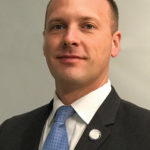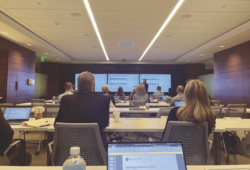Critical work to combat human trafficking
March 20, 2024. HealthTrust’s Ethics & Compliance Officer Tonya Goad offers an important update related to the organization’s participation in an industry workgroup on the fight against human trafficking. Read the update and an article that appeared in the Q3 2022 edition:
HealthTrust Performance Group applies high ethical standards both within our organization and with the companies with which we do business. The U.S. Department of Health and Human Services (HHS) Task Force to Prevent Human Trafficking recently published a National Human Trafficking Prevention Framework.
This framework is the culmination of collaborative work across many sectors, including the healthcare supply chain to assist in preventing, identifying and addressing forced labor and human trafficking.
HealthTrust SVP of Strategic Sourcing Jocelyn Bradshaw and I participated on the Joint Forced Labor Working Group to develop resources specific to the healthcare supply chain. Our connection to our membership, a collective of 1,800 hospitals and 65,000 non-acute healthcare facilities across the U.S., uniquely positions HealthTrust to impact human trafficking in the supply chain.
Our commitment is evident in our policies and practices:
- HealthTrust’s Code of Conduct, Supplier Business Relationship Statement
- Ensuring our supplier contracts prohibit human rights violations in all facets of supplier operations, including raw materials and manufacturing.
- We require full transparency about suppliers’ supply chains including geographical locations to assess regional forced labor risks.
- HealthTrust has implemented technology for assessing risk in our supply chain that may alert us to potential forced-labor and human-rights violations.
Forced labor and human trafficking affects millions of lives around the globe. We are committed to doing everything within our power to end such conditions. I invite you to review and embrace the HHS framework and join us at HealthTrust University Conference* in Orlando, August 12-14, where we will hold a panel focused on this important issue.
Yours in partnership,
Tonya Goad, MBA-HM, CHC
Ethics & Compliance Officer, HealthTrust Performance Group
*The panel discussion is scheduled for Monday, Aug. 12 at 1:30PM; watch the HTU registration site to sign up for the invitation only conference. Contact your HealthTrust Account Manager with conference-related questions.
_________________________________________
The following article appeared in the Q3 2022 edition.
Human trafficking is a silent epidemic, not just in our communities but globally. It exists in various forms. According to a government website, human trafficking involves the use of force, fraud or coercion for the purpose of forced labor or commercial sexual exploitation. Millions of men, women and children are trafficked worldwide every year, regardless of their age, race, gender or nationality. Victims and survivors of human trafficking are a growing part of who our healthcare systems care for.
Statistics show that more than 80% of victims enter the U.S. healthcare system through emergency departments (EDs), pediatric EDs, behavioral health centers and OB-GYN offices.
A patient may have repeat complaints of bruises and other injuries as a small sign of potential abuse, or providers might see a young woman who has had multiple gynecological emergencies or one who delivers a baby within a year of her last child, often on multiple occurrences. These are common early signs associated with victims of human trafficking.
HCA Healthcare’s Human Trafficking Workgroup is dedicated to providing a therapeutic resource to victims of this crisis, creating a pathway to survivorship. And, HealthTrust’s implores suppliers to do the right thing around labor and human rights within the healthcare supply chain.
It starts with awareness
HCA Healthcare’s Human Trafficking Workgroup is focusing on human trafficking awareness and prevention. It is made up of a multidisciplinary team—from clinical, behavioral health, practice and service line leaders to supply chain, security, education and communications personnel.

Led by Michael Wargo, RN, BSN, MBA, PHRN, Vice President and Chief of Enterprise Emergency Operations and Medical Transport at HCA Healthcare, the Human Trafficking Workgroup is focused on mitigating human trafficking in the supply chain as well as in educating and training healthcare professionals on how to identify victims and safely intervene. The workgroup also partners with the U.S. Department of Health and Human Services (DHHS) Office of Trafficked Persons (OTP). (See “Are Your Prepared for the Next Crisis?” for more on Michael Wargo’s work in emergency operations and readiness.)
Training healthcare professionals
One barrier to identifying human trafficking victims in healthcare settings is getting people to open up about what may be happening to them. “Signs and symptoms often tell a different story that the victims can’t share openly with health providers because the trafficker, who often accompanies them, answers the questions and fills out the forms,” says Wargo.
As part of formalized human trafficking care and intervention training, staff learns how to communicate effectively with victims and create an environment where they can be alone with the person to ask questions and find out details. Once an employee identifies a victim, there is an intervention. “We want to not only treat their physical symptoms, but to also get that person social and behavioral health assistance, case management and potentially law enforcement in hopes of creating a pathway to survivorship,” explains Wargo.
HCA Healthcare connected the DHHS/OTP with HealthStream to make human trafficking education widely available through its learning management system platform and effectively expanding access throughout the country. Free resources and training are available to all healthcare professionals through “SOAR Training,” a health and wellness training program designed to help them identify and respond to those at risk for or who are experiencing human trafficking.
Preventing forced labor in the supply chain

“While hospitals and other healthcare facilities focus on how to identify and help victims, HealthTrust is focused on ridding the supply chain of human trafficking,” says Workgroup Member Tonya Goad, MBA-HM, CHC, Ethics & Compliance Officer for HealthTrust. As a group purchasing organization and supply chain resource owned by seven healthcare systems, HealthTrust prohibits human rights violations in all facets of supplier operations, including raw materials and manufacturing.
In October 2021, a Malaysian disposable glove company was issued an order by U.S. Customs and Border Protection to detain imports of its disposable gloves after it was found that they were using forced labor. Other situations have occurred where people are working off thousands of dollars in company recruitment fees. “While these things may not be directly happening in our supply chain, we want to be aware of these events so we can work with our suppliers to quickly assess the risk and take action if needed,” says Goad.
“In every HealthTrust supplier contract and in our Supplier Code of Conduct, we outline a variety of expectations and requirements,” says Goad. By signing, suppliers are obligated to ensure they don’t have any forced labor or human rights violations and that they’re appropriately monitoring their supply chain.
Because of COVID-19, there is more transparency into the supply chain than ever before. “HealthTrust asks for companies’ geographical locations so that if there is a forced labor issue in a certain region, we know we can pivot to another supplier in another region or one that is not affected,” says Goad. While things have improved since the pandemic, more transparency in the supply chain is still needed. “It is critical for suppliers to share more information about where products are sourced with healthcare organizations in order to enable providers to better assess risk and make more informed purchasing and supply chain decisions.”
HealthTrust is in the early stages of implementing technology intended to alert to potential forced-labor and human-rights violations.
Effecting change in a big way
Serving 1,800 member hospitals and 57,000 non-acute healthcare facilities across the U.S. puts HealthTrust and its members in a unique position to significantly impact human trafficking in the supply chain. “Dedicating resources toward the prevention of forced labor and human rights violations in the healthcare supply chain is the right thing to do,” says Goad.
Wargo agrees. “This is just the beginning,” he says. “With HCA Healthcare’s footprint across the country and in the U.K., we know that we play an important role in this epidemic. For us, it’s a social responsibility.”
Wargo and Goad are joined by Jocelyn Bradshaw, HealthTrust SVP of Strategic Sourcing and Haley Porter, Emergency Operations Manager, HCA Healthcare Clinical Operations Group, as participants on an industry-expert comprised Forced Labor Working Group sponsored by the U.S. Department of Health and Human Resources. The new entity is a working group of the HPH Sector Critical Infrastructure Protection Partnership.
To learn more about human trafficking prevention, visit the Blue Campaign, and explore the SOAR to Health and Wellness Training Program.
Share Email Employee Training, Human trafficking, Q3 2022




